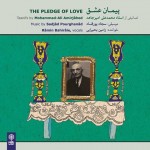The late 18th century was marked by profound societal changes across Europe, characterized by the rise of the bourgeoisie and the reshaping of musical patronage. Composers like Mozart responded to these shifts by adapting their compositional styles to align with the tastes and sensibilities of the emerging middle class. This article seeks to explore this phenomenon through an analysis of Mozart’s K. 499 quartet, also known as the “Hoffmeister” quartet, and his Prussian quartets, alongside the works of his contemporaries. By examining the evolution of the string quartet genre within the context of changing social structures and aesthetic preferences, this study aims to shed light on the dynamic relationship between music and society.
Category Archives: Articles’ List
Nasser Masoudi: The Voice of Gilan and a Legacy of Iranian Music
In Iranian music, certain singers have become emblematic of their homelands through their distinctive voices. Historical figures such as Eghbal Sultan, who epitomized the grandeur of Azerbaijani music, and Taj Isfahani, who conveyed the authentic essence of Isfahan, serve as notable examples from the Qajar era. Nasser Masoudi occupies a similar position; his voice emerged as a symbol of Gilan while also achieving national acclaim. Before him, Master Ahmad Ashurpur represented Gilan’s musical landscape, but his extended residence outside Iran limited his continuous engagement in the music scene. In contrast, Masoudi’s consistent presence allowed him to introduce the voice of Gilan to audiences across Iran.
Farhad Poupel: The Voice of the Shahnameh in the Orchestras Around the World
In an era when almost no trace of contemporary Iranian music can be heard in international concert halls, except (so-called!) avant-garde works that owe their existence solely to the fashionable slogans of the “pseudo-intellectual” crowd who have seized the already meager resources for performing classical music from the true artists of the field, the numerous performances of Farhad Poupel’s works shine as a ray of hope for lovers of sincere musical art. Without resorting to trendy slogans, he has kept the flame of Iranian classical music alive purely through the power of his artistry.
Five Major Myths About Mozart’s Life
Wolfgang Amadeus Mozart, the renowned Austrian composer, is undoubtedly one of the greatest geniuses in the history of classical music. However, his life is surrounded by numerous myths and legends, some of which are not based on facts. This article explores five of the most common misconceptions about Mozart’s life.
Bahma Rajabi Passed Away!
Bahman Rajabi, the renowned tonbak (Persian goblet drum) player and educator, passed away at his home at the age of 86 due to a heart condition. He was the founder of a distinctive school of tonbak playing, and his teaching methods have been widely used by instructors of the instrument for decades..
Reza Vohdani; Unveiling unpublished works, preservation of Iranian classical music
Reza Vohdani is a renowned name among tar (traditional Iranian instrument) players, especially within the Iranian music community that values the meticulous practice and teaching of traditional music. While Vohdani honed his skills in music theory and tar playing under the guidance of masters like Ali-Naghi Vaziri, Ali-Akbar Shahnazi, Hossein Dehlavi, and Ahmad Forutan-Rad, it is his unwavering dedication to studying, documenting, and teaching the Iranian classical music repertoire that has solidified his prominence in the field. Recently, Vohdani’s family decided to make his preserved works accessible to the wider art and music community. In this regard, The Persian-language newspaper ‘Iran’ spoke with Sadjad Pourghanad, a musician, university instructor, and music researcher, who shared his opinion into the project, as detailed in the interview below.
Ahmad Pejman Passed Away!
Composer and music teacher Ahmad Pejman (1935–2025) passed away on August 29 in Los Angeles, USA, after several weeks of illness. His most recent symphonic work performed in Iran was Land of the Brave (“Sarzameen-e Delavaran”), which was staged in 2017 with the Tehran Symphony Orchestra. According to the family’s decision, his body will be laid to rest in the United States.
Timeless or Timely: The Role of Historical Context in Defining Artistic Value
Imagine that, in the course of historical research, we discover a musical piece whose compositional techniques (including form, melody, texture, and orchestration) resemble those of a second-rate 19th-century composition. But further investigation reveals that this work predates that period by 200 years. Can we still deem it insignificant? Certainly not. Here, the first major role of historical judgment becomes evident.
Leading the Charge in Censorship
Davoud Pirnia, writer and musicologist was the founder of “Golha” (Flowers of Persian Song and Music) programs on Tehran Radio (1956-1966). He received his early education from his father, Hassan Pirnia (Moshir al-Douleh), and several tutors of the time (Taraghi, interview, July 1989) and continued his studies at Saint Louis School in Tehran and then in Switzerland and graduated in law. While studying law, Pirnia got acquainted with European classical music. Upon returning to Iran, he was employed by the Ministry of Justice and founded the Lawyers’ Guild. Then he was transferred to the Ministry of Finance and established the Department of Statistics in this ministry. Later, he became the head of the state inspection office at the Prime Ministry; he was, then, promoted to the position of the Deputy Prime Minister (Navab Safa, interview, August 1999)
The Legacy of Khosrow Jafarzadeh
This year marks the fifth anniversary of the passing of Khosrow Jafarzadeh (Khosrow Djafar-Zadeh), a distinguished architect and pioneering researcher of Iranian music, whose contributions to the magazine “Harmony Talk” have left an indelible mark on the field. The absence of this remarkable individual has significantly impacted the expansion and advancement of his theories, which are heralded as some of the most progressive in the history of Iranian music
Latest posts
- Transition to Enlightenment: Six Lectures on Mozart’s String Quartets (5)
- Nasser Masoudi: The Voice of Gilan and a Legacy of Iranian Music
- Farhad Poupel: The Voice of the Shahnameh in the Orchestras Around the World
- Five Major Myths About Mozart’s Life
- Bahma Rajabi Passed Away!
- Reza Vohdani; Unveiling unpublished works, preservation of Iranian classical music
- Ahmad Pejman Passed Away!
- Timeless or Timely: The Role of Historical Context in Defining Artistic Value
- Leading the Charge in Censorship
- The Legacy of Khosrow Jafarzadeh
- Transition to Enlightenment: Six Lectures on Mozart’s String Quartets (4)
- Fereydoun Shahbazian, An Iranian Musical Icon Passed Away
From Past Days…

“Pledge of Love”
The “Pledge of Love” is the first album in a series composed based on the tasnifs by the renowned Iranian tasnif-maker Mohammad Ali Amir Jahed and recorded by Sahba Kohan Ensemble with Ramin Bahiraie as signer.

Principles of Violin Playing (I)
The present series of training articles, “Principles of Violin Playing”, seek to help students, to appropriately understand this field, by gradually introducing, categorizing, and teaching the myriad relevant points. One of the principles of playing violin, which must be always kept in mind, is that the selection of the most natural position for the body parts while playing is the best and most appropriate solution. As a matter of fact, any unnatural body part position which requires lots of energy or unusual stretching to maintain, is wrong.

New Technique for Playing Classical Guitar (I)
Joint application of the two techniques of “Lip” and “Nose” could be effectively applied for hearing and playing far-away intervals, by the Classical Guitar. Before this, a Classical Guitar player had to waive playing intervals not possible with the left hand, and had to replace or eliminate some notes, making it possible to play such intervals; specifically the capability of the left hand of the musician, was also a factor in such a selection. These methods are hereby illustrated by photographs and a video-file, in order to provide optimum comprehension of applying these methods, invented by the author; specifically the “Lip” technique, which is considered to be a more significant technique, emphasized by the author.

Interview with the Makers of the New Qeychak (III)
In this project, my specialized responsibility was the basic drawings of the desired instrument with the help of engineering and mechanical software. I have also the carried out phases related to engineering designs, related variables, and volume and weight calculations under Mr. Ziaei’s direct supervision from the very beginning. Regarding the challenges of this work, suffice it to say that the set of designs for the instrument lasted more than 9 months in the final stage of the project only.

From the Last Instrumentalist to the First Composer (II)
Rouhollah Khaleghi was the master of composing beautiful melodies. He was the premier of the course of history which was first established by Ali Naghi Vaziri and which improved the Iranian music from simply a gathering music to the classical music of the country. First efforts to compose independent and instrumental music can be also traced in Khaleghi’s works.

Women and the Music Environment in Iran
The life territory of the female-male relations in the Iranian cultural context is basically a domestic territory and not a social-living one in the labour and leisure domains. To prove this, it only suffices to consider the Iranian men’s viewpoints about women. For the Iranian men, there are three perspectives regarding the women: mother, sister and wife. Mother represents the emotional territory; sister represents the logical territory at home while wife represents the sexual territory.

Principles of Violin Playing (VIII)
1.5.1.3.sometimes, a player, due to different reasons, may decisively want to play continuously two notes with a half-step by means of the same finger, in such a case, it’s necessary to open the interior curve of the finger like a spring. Naturally coming back, the curve of finger should be closed and the finger should become curved shape again (see paragraph 3.1.2.1).

Payam Taghadossi: Talented Iranian-Austrian Cellist
Payam Taghadossi (born in 1989) started his musical education at the age of 4 years with Monika Scherbaum in Bregenz (Austria). At the Conservatory Feldkirch he joined the class of Imke Frank and Martin Merker. Later he studied in Zurich (Switzerland) with Thomas Grossenbacher and Christian Proske, where he 2011 graduated as a Bachelor of Arts in Music Performance. Two years later as the student of Rafael Rosenfeld he received his Master of Arts in Music Performance diploma and later graduated as a Master of Arts in spezialized Music Performance in 2016 from the Hochschule für Musik Basel FHNW.

History’s Impact on Evaluating a Work of Art
With this description, we have automatically included a criterion called “History”, Until we know the time of the creation of a work of art, we cannot judge whether it has been easy to create or not. Suppose that, in a historical study, we find a musical work that is similar in compositional techniques (including form, melody, context, and orchestration) to a minor work of the nineteenth century; however, our research proves that, this work dates back to 200 years prior to that date. Can we still consider this work insignificant? Definitely not! So this is where the first use of history-based judgment comes into play.

Banan: the Artist of the Age
Gholam Hossein Banan was born in 1911 in Tehran. He was born in an affluent art-loving family who were Naser al-Din Shah Qajar (1848-1896)’s relative. The Qajar King was his mother’s uncle on her father’s side. He learnt his first lessons in music while his father sang Iranian avaz (improvised rhythmic-free singing), he then attended classes by the renowned Iranian composer, Morteza Neydavoud (1900-1990) along with his sisters; the composer is, therefore, considered as his first teacher. He then learnt Iranian avaz under the supervision of Mirza Taher Zia Resaee (Zia-o Zakerin) and Naser Seif in an oral manner.